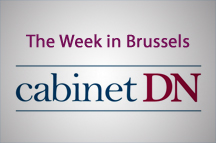 This week’s EU agenda has been marked by a number of power struggles between the three institutions, each of them reaffirming their position on the exchequer before the upcoming political changes in the European Parliament and Commission.
This week’s EU agenda has been marked by a number of power struggles between the three institutions, each of them reaffirming their position on the exchequer before the upcoming political changes in the European Parliament and Commission.
Data protection: Parliament v Member States
 The European Parliament closed its first reading on the data protection Regulation by adopting German Green MEP Jan Philipp Albrecht’s report. In light of the NSA spying scandal, MEPs want i.a. to strengthen the obligations of digital companies to inform national authorities and citizens when their data is provided to a third party.
The European Parliament closed its first reading on the data protection Regulation by adopting German Green MEP Jan Philipp Albrecht’s report. In light of the NSA spying scandal, MEPs want i.a. to strengthen the obligations of digital companies to inform national authorities and citizens when their data is provided to a third party.
 Albrecht has been particularly outspoken against the Member States who have not made much progress on this proposal, thus slowing down its adoption. "Each day we waste is another day wasted for European citizens and consumers and companies in Silicon Valley. Those who try to get around data protection in the EU are getting a little richer each day", he commented. The Greek Presidency is still hopeful that it can reach some consensus within the Council before the end of its Presidency. Even if they are successful, there will still be a long way to go before the final adoption.
Albrecht has been particularly outspoken against the Member States who have not made much progress on this proposal, thus slowing down its adoption. "Each day we waste is another day wasted for European citizens and consumers and companies in Silicon Valley. Those who try to get around data protection in the EU are getting a little richer each day", he commented. The Greek Presidency is still hopeful that it can reach some consensus within the Council before the end of its Presidency. Even if they are successful, there will still be a long way to go before the final adoption.
Seed Regulation: Parliament v Commission
The European Commission's proposal for plant reproductive material Regulation would merge 12 Directives into a directly-applicable law. More interesting than the content of the text itself, which is quite technical, is the opposing views of the Parliament and the Commission. MEPs expressed great dissatisfaction with the Commission’s proposal, which resulted in a large number of issues to be dealt with in secondary legislation. They asked Health and Consumer Commissioner, Tonio Borg, to withdraw the proposal and present an improved one. Borg refused, saying MEPs had misunderstood the Commission’s intentions. The proposal now goes to the Council, which can either concur with the Parliament and reject it altogether or propose amendments, which would then be discussed in the second reading.

A bad week overall for Borg, who also saw another Commission proposal on the definition of nanomaterials in food, being vetoed by the European Parliament, led by Green Swedish MEP Carl Schlyter. The Commission’s proposal would have exempted food additives from nano-labelling, which was unacceptable to MEPs.
These two files show the Parliament flexing its muscles and making clear to the Commission that they are ready to stick to their views, even if it means delaying legislation.
Rule of Law: Commission v Member States
The Commission adopted a non-binding procedure to discipline Member States breaching the rule of law in their countries. Justice Commissioner Viviane Reding presented this new procedure as a warning to show that the Commission could put political pressure on Member States, before resorting to stronger sanctions foreseen in Article 7 of the Treaty, which have proven impossible to enforce in recent cases in Hungary and Romania.
Next round: European Council meeting on 20 and 21 March. On the agenda: banking secrecy, single resolution mechanism and Ukraine.














